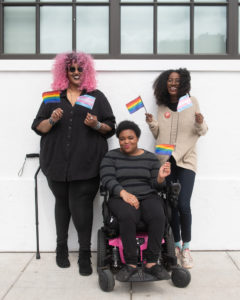Corporate-sponsored lip service. Calls for the kink community to go back in the closet for the sake of a family-friendly Pride. And now the so-called “liberal” media (i.e., The Washington Post and The New York Times) siding with the GOAL (Gay Officers Action League) cops who want to be allowed to march in uniform in NYC’s annual commemoration of the Stonewall Uprising, a civil rights event triggered by – you guessed it – police brutality. It’s enough Orwellian drama to make me want to turn in my queer card.
“If you’ve been to a pride parade, you know it’s a celebration of acceptance and inclusion. That’s why it’s beyond troubling that a community made up of so many who’ve been rejected by their families because of who they are is now turning on its members because of what they do for a living. This is wrong. This is shortsighted. This is a mistake.” This is from a recent New York Times editorial board disquisition titled “A Misstep by the Organizers of Pride.” This is ridiculous.
 As is Jonathan Capehart’s Washington Post op-ed “Let LGBTQ cops march in New York City’s pride parade.” Capehart, a well-known MSNBC host who is also Black, gay – and most importantly, cisgender and private school-educated – begins his essay waxing rhapsodic about a NYC pride parade he attended over two decades ago in which the GOAL marchers received as much cheers as the “Dykes on Bikes.” He ends it by acknowledging that “Trans women of color are being murdered at alarming rates. Bigotry has taken new forms. There are still too many instances of police neither protecting nor serving LGBTQ and other marginalized communities. But the response shouldn’t be to ban LGBTQ police from a parade.” Really? Why not?
As is Jonathan Capehart’s Washington Post op-ed “Let LGBTQ cops march in New York City’s pride parade.” Capehart, a well-known MSNBC host who is also Black, gay – and most importantly, cisgender and private school-educated – begins his essay waxing rhapsodic about a NYC pride parade he attended over two decades ago in which the GOAL marchers received as much cheers as the “Dykes on Bikes.” He ends it by acknowledging that “Trans women of color are being murdered at alarming rates. Bigotry has taken new forms. There are still too many instances of police neither protecting nor serving LGBTQ and other marginalized communities. But the response shouldn’t be to ban LGBTQ police from a parade.” Really? Why not?
Tellingly, both pieces happen to reference the vocal support GOAL historically has received from the queer and queer-allied crowd – while forgetting that the loudest applause came at the beginning of GOAL’s participation in Pride, back when there was still hope that putting LGBTQ+ folks on the force might make a difference in how the queer community was policed. But to read these writers it’s almost like the awakening in the aftermath of George Floyd’s murder never happened. As we should know by now (GOAL was founded in 1982 after all!), the difference made by gay and lesbian cops – and it is mostly cisgender, gay and lesbian cops who are crying foul at the exclusion – has been marginal at best. Or perhaps it just hasn’t trickled down to the segments of the queer community that need reform most – the trans women and young hustlers who kicked off the Stonewall Uprising against police brutality in the first place!
Thankfully, there have been a few voices of reason, most notably that of (Black and queer) social commentator Roxane Gay. Gay manages to cut through all the obfuscating b.s. in a response to both Capehart and the editorial board with her own New York Times guest essay “Cops Don’t Belong at Pride.” In it she states, “Let’s be clear: We should not have to contort ourselves to make straight people more comfortable with our lives. Assimilation cannot be the price we must pay for freedom…The idea that we should now forgive the past and make peace with oppressive police forces is ludicrous.”
She then takes to task Capehart for what she deems his false equivalency in describing queer folks who’ve for so long been rejected by loved ones as now “turning on” members because of their chosen occupation. As Gay brilliantly points out, “We are not turning on anyone. Law enforcement is not an innate identity. The police are not marginalized. They aren’t disowned by their families for carrying a gun and badge. They haven’t been brutalized or arrested because of how they make a living.”
Indeed, as this sharp thinker also notes, cops are “more than welcome to join Pride celebrations — unarmed and in civilian clothing.”
Unfortunately, as of this writing, I’m still frustratingly unsure where things stand. (Heritage of Pride, which organizes the parade, went from banning GOAL from marching, to reversing the ban, to reversing the reversal just a few hours later.) Though perhaps we can look forward to avoiding all the controversy next year, once the New York Times puts a trans person on the editorial board, once the Washington Post invites a gay sex worker to write an op-ed. And once Heritage of Pride just lets all those trans women of color in the NYPD decide.
Image credits: Tony Webster and Disabled and Here

